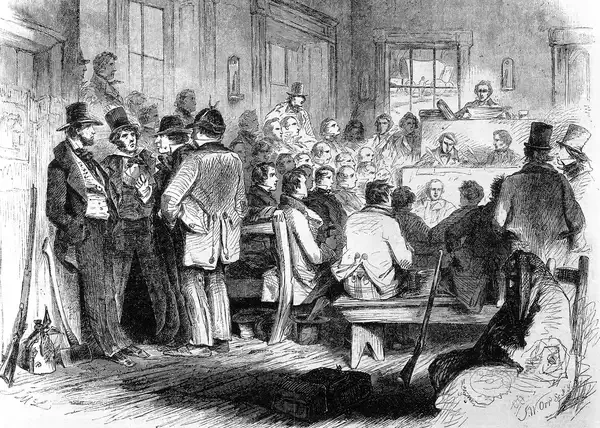How the Dred Scott Decision Affected the U.S. Election of 1860
The Dred Scott decision intensified national tensions over slavery, influencing the 1860 U.S. presidential election by polarizing voters. It invalidated the Missouri Compromise, inciting Northern outrage and bolstering the Republican Party's anti-slavery platform. The ruling alienated Northern Democrats and deepened sectional divides, contributing to Abraham Lincoln's election. Southern states, fearing the potential loss of slavery, saw Lincoln's victory as a threat, which accelerated the secessionist movement, setting the stage for the Civil War.

The Dred Scott Decision, delivered by the U.S. Supreme Court in 1857, was a pivotal moment in American history that significantly influenced the political landscape leading up to the Election of 1860. This landmark ruling declared that African Americans, whether enslaved or free, could not be considered American citizens and thus had no standing to sue in federal court. Furthermore, it ruled that Congress lacked the authority to prohibit slavery in federal territories. As we explore the ramifications of the Dred Scott Decision, we will focus on how it intensified sectional tensions and played a crucial role in shaping the political dynamics of the 1860 election.
The Intensification of Sectionalism
One of the most profound effects of the Dred Scott Decision was the exacerbation of sectionalism in the United States. The ruling galvanized anti-slavery sentiments in the North while emboldening pro-slavery advocates in the South. The ''North'' viewed the decision as a blatant attempt to expand slavery into the territories, undermining the principles of freedom and democracy. Conversely, the ''South'' interpreted it as a validation of their rights to own slaves and maintain their economic interests.
This growing divide was reflected in the political parties of the time. The ''Republican Party'', formed in the 1850s as an anti-slavery party, gained significant traction in the North. The Dred Scott Decision rallied Republicans around a common cause, strengthening their platform which emphasized stopping the expansion of slavery into the territories. In contrast, the ''Democratic Party'' faced internal divisions between Northern Democrats, who were more moderate on the issue of slavery, and Southern Democrats, who were staunchly pro-slavery. This fracture within the Democratic Party weakened their overall unity and effectiveness heading into the election.
Political Mobilization and Public Sentiment
The ruling also led to increased political mobilization among various groups. Abolitionists and anti-slavery activists used the decision to rally support for their cause, emphasizing the moral imperative to combat the spread of slavery. The ''Republican Party'' capitalized on the outrage generated by the decision, utilizing it as a rallying cry to unify Northern voters against the perceived injustices of the South.
As public sentiment shifted, the Dred Scott Decision became a focal point in the debates and campaigns leading up to the election. The Republicans framed the election as a referendum on slavery and freedom, leading to heightened political engagement among citizens. Voter turnout surged, as many felt the stakes of the election had never been higher.
The Candidates and Their Positions
The election of 1860 featured four main candidates, each representing different factions and interests:
| Candidate | Party | Position on Slavery |
|---|---|---|
| Abraham Lincoln | Republican | Opposed the expansion of slavery into the territories |
| Stephen A. Douglas | Northern Democrat | Supported popular sovereignty |
| John C. Breckinridge | Southern Democrat | Supported the protection of slavery in the territories |
| John Bell | Constitutional Union | Avoided the issue, focusing on preserving the Union |
Lincoln's position, which explicitly opposed the spread of slavery, resonated strongly with Northern voters who were alarmed by the implications of the Dred Scott Decision. His campaign effectively highlighted the moral and political stakes involved, making the election a crucial moment for the anti-slavery movement.
The Outcome and Its Aftermath
Ultimately, Lincoln won the election of 1860, receiving 180 electoral votes against his opponents, despite not being on the ballot in most Southern states. His victory was viewed by many in the South as a direct threat to their way of life, leading to heightened tensions and ultimately the secession of several Southern states from the Union.
The Dred Scott Decision, therefore, not only influenced the election but also set the stage for the Civil War. The ruling's implications regarding citizenship and the legality of slavery continued to echo throughout the conflict, shaping policies and attitudes on both sides. It became evident that the decision had a profound impact on the national conversation surrounding slavery, freedom, and civil rights.
Conclusion: The Lasting Legacy
The Dred Scott Decision remains a critical chapter in American history, illustrating how judicial rulings can have far-reaching political consequences. As we reflect on the Election of 1860, it is clear that the decision intensified sectional divisions, mobilized political action, and ultimately played a significant role in determining the future of the nation. The events that unfolded in the wake of the election underscore the importance of understanding the complexities of our legal and political systems and their profound influence on society.
In summary, the Dred Scott Decision served as a catalyst for change, demonstrating the intertwined nature of law, politics, and social movements in the fabric of American history.












